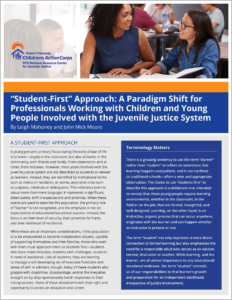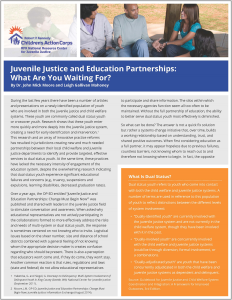Resources – Special Topics
Click here to return to the main Resources page.
 “Student-First” Approach: A Paradigm Shift for Professionals Working with Children and Young People Involved with the Juvenile Justice System
“Student-First” Approach: A Paradigm Shift for Professionals Working with Children and Young People Involved with the Juvenile Justice System
Leigh Gallivan Mahoney and Dr. John Mick Moore, Robert F. Kennedy National Resource Center for Juvenile Justice, 2018
Education is a vital component of every young person’s development toward adulthood and often is the key protective factor against a variety of disadvantages. Why, then, does it become a secondary consideration when a youth becomes justice-involved, a time when it might be most crucial? In “Student-First” Approach: A Paradigm Shift for Professionals Working with Children and Young People Involved with the Juvenile Justice System, Leigh Mahoney and John “Mick” Moore offer a critical view of the myriad ways that decision-making on educational issues, from placement and transitions to disability and discipline, can positively impact outcomes for youth who are justice-involved. This brief offers professionals a general overview and a reflective framework through which to view their own opportunities to consider these children and young people as “students first.”
 Juvenile Justice and Education Partnerships: What Are You Waiting For?
Juvenile Justice and Education Partnerships: What Are You Waiting For?
Dr. John Mick Moore and Leigh Gallivan Mahoney, Robert F. Kennedy National Resource Center for Juvenile Justice, 2016
It is widely agreed upon that effective partnership between juvenile justice systems and educational entities result in positive outcomes for both the youth involved, and communities as a whole. Why, then, does it seem so difficult to create these partnerships? In Juvenile Justice and Education Partnerships: What Are You Waiting For? Dr. John Mick Moore and Leigh Gallivan Mahoney provide a pragmatic look at the necessary steps and key components of developing justice-education partnerships, as well as an in-depth description of King County, Washington’s successful, and still thriving, PathNet collaboration. This brief delivers a “how to” on identifying champions, leveraging incentives and aligning philosophies, as well as avoiding potential hazards and ensuring the sustainability of positive partnerships.
